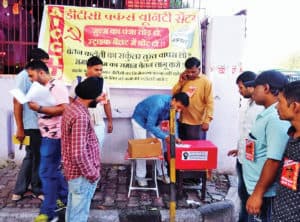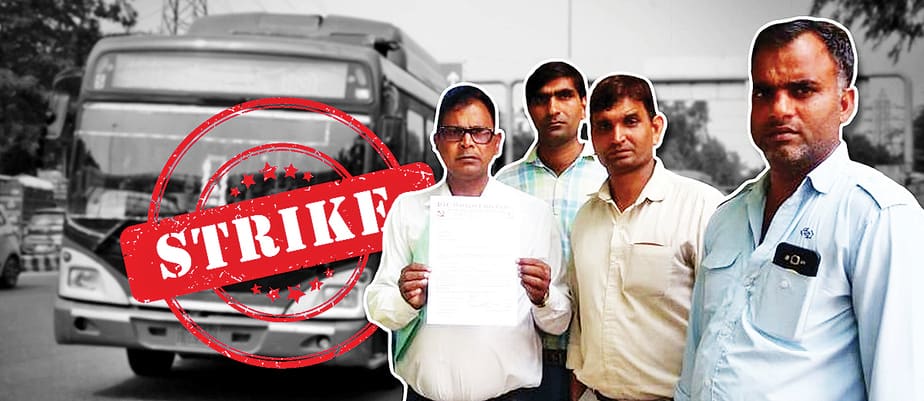DTC contract workers have called for a strike on October 29 to protest wage cuts of almost 25 per cent. It will be the first major strike in 30 years
Ranjit Singh (name changed) is 40 years old, and the past month and a half has been stressful for him. A driver on contract with the Delhi Transport Corporation (DTC), Singh travels every day from his house in Faridabad to the bus terminal located in South Delhi. On some days, he has to wait for hours before starting his day’s duty. Only once he is allocated a bus, the eight hours of duty begin. Today, Singh reached the terminal at 7 am. It’s been nearly three hours and he still hasn’t been assigned a bus.
At a time of rising inflation and high fuel prices, the Arvind Kejriwal government decided to cut the daily wages of contractual workers attached to the DTC by about Rs.3,500-4,500 per month—nearly 25 per cent of their wages. In its justification, a circular issued by the DTC management said that the wage cuts were being implemented in the light of the Delhi High Court’s decision which quashed the minimum wages decided by the Delhi government.
The contractual workers have decided to respond to this decision—which they call a “betrayal”—with a complete strike on October 29. The anger amongst the DTC contractual workers can be gauged from the fact that the lockdown was supported by a whopping 98% of contractual workers who participated in the ballot for a strike.
“We can’t keep ourselves focused on the duty anymore,” says Singh. “After the wage cuts, coming for the duty is a mental harassment. It’s betrayal of the promises made to us.”
In March 2017, the Kejriwal government had increased the minimum wages for unskilled, semi-skilled and skilled workers to Rs 13,350, Rs 14,698 and Rs 16,182 per month, respectively. After the Delhi High Court order on August 4, 2018, the DTC issued a notification on August 21 saying employees will now get the minimum wage of 2016 and the meagre dearness allowance of 2017 and 2018. The notification said the new wages will be Rs 10,270 for unskilled, Rs 11,362 for semi-skilled, and Rs 12,506 for skilled workers. That’s Rs 412, Rs 437 and Rs 481 daily wage. , The DTC also decided to deduct the extra wages paid for 13 days in August from the workers’ salaries in the coming months.
The workers allege that despite assurances, the AAP-led Delhi government has failed to bring them any reprieve. Abhishek, the Delhi state general secretary of the left-leaning trade union All India Central Council of Trade Unions (AICCTU), says, “The irony is even though Delhi labour minister Gopal Rai had called the meeting of trade unions to assure that the Delhi government will bring relief for the workers by implementing the Centre’s minimum wage orders, its own fellow minister Kailash Gahlot reduced the daily wages in DTC.” The contractual workers are waiting for a concrete response from the transport minister or the DTC management—of which Gahlot himself is the chairman.
Transport Secretary Varsha Joshi said, “There is a separate management for the DTC” and declined to comment on the agitation of the DTC workers. DTC’s manager, public relations, Honey Khattri too showed his “inability” to comment as he was “not authorised to speak”. The response mechanism of the AAP minister-led management was in complete coherence with cultures of mainstream political parties and corporate houses who refuse to comment on workers’ grievances.
Peanut salaries
The DTC workers find it hard to restructure their budgets after the wage cuts. “They have destablisiour monthly budget. Those who had taken loans will have to now quit the DTC and look for other jobs,” says a 28-year-old conductor who travels to Kalkaji Depot every day from Delhi’s Badarpur area. Like Singh, he too has been waiting for almost three hours to get the day’s duty.
Singh explains his daily schedule to show what the DTC contractual employees have to go through to get their paltry salaries.
He says, “I have to wake two hours prior to reaching the depot.” Then he waits, often for hours, to be allocated a bus, after which he serves eight hours duty. “In a day, we do six trips of which four are main trips.” The drivers are given 90 minutes to complete each of the four trips. Any delay in the completion of the journey is duly noted. Given the state of Delhi traffic, it’s a race against time. Singh says, “When we get late, they would mark ‘not OK’.”
The drivers and conductors who met this correspondent claim that its often 12 hours of work by the time they get done with the duty. Singh, who had joined the DTC in 2012, said, “We kept working with the DTC in the hope of getting regularised. But everything seems unsure now.”
The contractual employees also fear departmental wrath for speaking to the media and going against the government. “We had started tweeting promises made by Arvind Kejriwal. The department asked us not to speak against the government or face action,” says 30-year-old conductor who has been working for the DTC for over nine years now. He is a BCom graduate from a Delhi University college. The conductor says that while the DTC is claiming to be complying with the court order, they are in violation of the Supreme Court order which says, “Equal pay for equal work”.
Ankit Srivastava, 28, is a DTC contractual conductor. He says, “The SC order clearly says that for a permanent nature of work, the employment should be of permanent nature too. The high court has given the order on minimum wages. Where does it say that the DTC has to reduce the salary, or give only minimum wages to its contractual employees?”
Srivastava has a law degree and he seems to be spearheading the campaign for the strike call of October 29.
First major strike after 1988
According to the DTC Workers Unity Centre (workers union) and the AICCTU, this is going to be the first major strike called by DTC workers ever since the historic strike of 1988. “The DTC has witnessed several protests in the past two decades. But this is the first time ever since 1988 that over 10,000 workers have given a mandate for a strike,” AICCTU’s Abhishek said.
The strike ballot was conducted in the last week of September across depots of the DTC. The state carrier has roughly over 12,000 contractual employees. After four days of the voting, a total of 10,254 votes were cast and about 98.2 per cent voted “yes” for the strike. On October 5, the workers handed over the strike notice to the DTC management. The workers will go on a symbolic strike on October 22 and the final strike will be called on October 29.

While the March 1988 strike in the DTC remains historic, it’s seen two major protests in the last four years. In January 2014, the contractual workers had united demanding permanent jobs. Later in May 2015, the DTC workers went on strike when a 40-year-old DTC driver died after thrashed by a motorist. The workers were demanding compensation of Rs 1 crore for the family of the deceased. But the government has often resorted to crackdown on these strikes by using the Essential Services Maintenance Act (ESMA) against the striking employees. The act enables the government to take strict action against the errant striking employees.
However, not everyone is hopeful. “I doubt the strike will bring any relief. On the contrary, one day of salary will be deducted. And if we indulge in any activism, they will get rid of us as we have already served many years in the DTC. The new recruits will not muster up the courage to speak,” the 29-year-old conductor said.
An ailing unit
If we speak strictly in terms of revenue, the DTC has been a burden on the Delhi government for years now, and the situation has only deteriorated over time. According to government records in 2017-18, the DTC had 3,974 buses and the cluster (run by private vendors under the Delhi Integrated Multi-Modal Transit System) had 1,758 buses. The number of DTC buses has been dwindling with every passing year. For instance, in 2016-17, it had 4,126 buses. These numbers are way shorter from the ideal 11,000 buses mark set for Delhi. The Arvind Kejriwal-led government has consistently failed to address the transportation crisis in the national capital.
Despite having a ridership of 31.03 lakh and 83.4 per cent average occupancy, the DTC has been incurring losses for years. For instance, the operating cost of the DTC in 2017-18 was Rs 92 per kilometre and the revenue was Rs 31 per kilometre. This meant the DTC was incurring a loss of Rs 61 loss per kilometre.
AAP’s betrayal of promises
Back in 2014, Arvind Kejriwal had promised to regularise the DTC contractual workers. Even in the runup to the 2015 polls, the AAP’s poll plank included the regularisation of contractual workers attached to Delhi government units. But in the past three-and-a-half years, the government has failed to deliver on these promises.
Another conductor, who did not want to be named, says, “Arvind Kejriwal has betrayed our trust. He had promised if the AAP returns to power with a full majority, it will regularise our jobs. Instead of regularising, it has reduced our salaries.”
Many people say that that a large chunk of DTC contractual workers is stuck in a dilemma. “In the hope of getting regularised we have remained with the DTC, it’s been almost a decade now,” says another conductor attached with the south Delhi depot.
“They must decide on our future now. Either regularise us or let us know. We will shed the false hopes and look for new jobs.”
www.newslaundry.com





